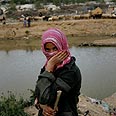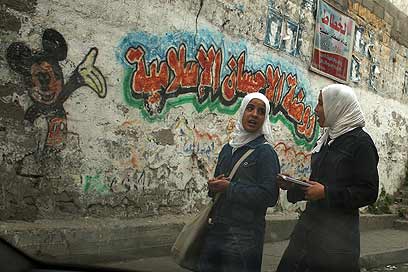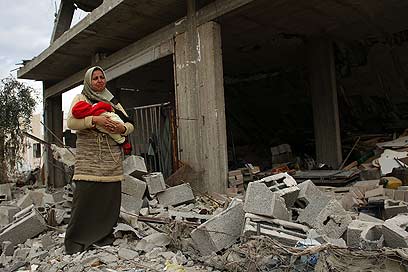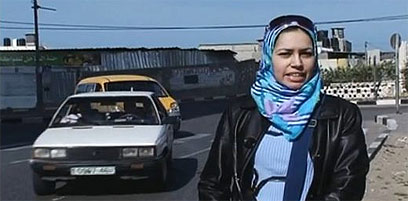
Lost in Gaza: The hidden women
About 77% of 760,000 women living in Strip suffer from some type of violence; some 90% of them are unemployed. Between economic emergency and strict Islamic rule, their voice is hardly heard. Those of them refusing to accept situation tell Ynet about their difficulties, frustration and desire to bring about change
This quote is taken from interviews conducted on behalf of the Geneva Center for the Democratic Control of Armed Forces (DCAF) with Palestinian women from June to November 2009, as part of a series of studies dealing with Gaza women's sense of security and personal comfort.
The research found that alongside the difficult situation in almost all areas of life (welfare, poverty, personal and general safety), the women report of a constant increase in domestic violence.
It's nearly impossible to gain access to updated data on domestic violence in Gaza, and the figures which do exist are not easy to digest. Several months ago, the Gaza-based Palestinian Women's Information and Media center released a study based on sessions and interviews with 350 women at the end of 2009.
The data revealed that 77% of the interviewed women suffer from some type of violence. Some 52.3% said they suffer from physical violence, 14.6% from sexual abuse, 67% from verbal violence and 71% from mental violence.
In spite of this reality, voices calling for a change in the Gazan society are barely heard. And still, there are several young women who insist on taking control and responsiblity for their fate. Some of them told Ynet about the reality they are living in and the hopes to change it.
'Women's issues not important'
"The police sometimes say to an abused woman to go back home because they are not able to listen to her because they are busy with something more important than women’s issues."
Women's liberation sounds like a distant slogan in Gaza, and violence against women is not on the top of the authorities' list of priorities.
"The authorities do punish violent men sometimes, but the law itself is week, especially when it comes to honor killings – the punishments are too light, "says Huda Hamuda, who manages the database center.
Nahala (fictitious name), 30, was physically and mentally abused by her husband for more than 10 years. All these years she refused to divorce him or try to ask for help, due to fear and environmental pressure. Three months ago she got divorced and her children were taken away from her, as ruled in most custody battles between couples in the Strip. This is also the reason why most women won't even consider divorcing their husbands.
"I never went to the police to complain about him. He threatened to kill me if I did that," Nahala said in her testimony. "I didn't complain and didn't go to the aid organizations because I don't think anyone could have helped me. I was afraid my husband would find out."
In once case, she said, her husband was arrested after locking her in the house, but was released by the police several hours later. "My heart is broken as I live far away from my children, but my life with him was hell. I'll never go back there."

Scary to walk in the street at night (Photo: Getty Images Bank)
Officials at the Gazan Information center explain that even before taking Hamas' Islamic rule into account, violence against women in the Strip has a more fundamental reason – poverty. According to the figures, 40% of the Gaza Strip's 1.55 million residents are unemployed.
"It’s hard to imagine a family living in dignity while seven of its members live on less than $3 a day, all the more so families who have lost their homes and some of their members," Hamuda explains.
"If the employment rate among women stood at about 14.5% in 2006, now it stands at less than 10%. In such a reality, these figures are not surprising," she says.
One of the women adds, "The husband is not able to afford household requirements, so he will take out his anxiety on his wife and children. If my daughter asks for something from her father, he will beat her because he is not able to provide it. He does not hate her, but he feels helpless."
'Burned by acid for not wearing a veil'
The lack of opportunities in work and education is another reason causing young men to wander the streets and harass women out of boredom and frustration. The Islamic rule contributed to the deepening oppression as well.
The Hamas government is implementing the Sharia laws in practice, and last year approved a controversial Islamic code of behavior, forcing women to wear a veil in governmental schools and courthouses.

"I am thinking of sending my daughter out of the Gaza Strip because she is not wearing the hijab," one of the interviewed women said. "And I am afraid that while she is walking in the street there is a risk of her being abused by someone. Recently, we heard about girls who were beaten or burned by acid for not wearing the hijab. I am urged to have my daughter take a taxi (to go to and from our house), and it is preferred to send someone else (along) to protect her."
"When we walk, some guys throw words at us about how we dress," said another woman. "How can you feel secure if you cannot walk in the street? (...) You are putting your head in a scarf and your body in the jilbab and you still see the eyes looking and the comments on your body and other things."
No work at night
One of the young woman refusing to accept this situation is Hadia al-Gul, 24, a journalist working for Palestinian news agency Maan. Gul told Ynet about the difficulties in being a journalist in Gaza.
"Women have to be in traditional roles of a kindergarten teacher, a nursemaid or a schoolteacher – definitely not a journalist reporting from the ground, sometimes from dangerous situations, interviewing men and working with them. As for the work itself, being a woman is a huge shortcoming," she admits.
But Gul's professional troubles do not end here. "I'm not allowed to work at night, so if something happens at night – I won't go there. During the war, for example, I wanted to interview families living on the Strip's border. The news desk and my family would not let me go there."
The family's intervention in the work is a familiar phenomenon among Gul's female colleagues as well. "Many of my fellow workers say the family decided where they will work, according to their religious affiliation, according to the family's values and according to the nature of work with the men at the news desk."
Gul believes that the economic situation is one of the main obstacles to change in Gaza. "How can one expect a woman to have a job when her husband and father don’t have one? Even when women are trained, they don't work in what they were trained to do but in what there is.
"Women yearn for opportunities to live their lives in full, express their talent and abilities and be creative. I have friends who studied to be lawyers and doctors, but have no option to work. Girls studying communications find it difficult to integrate into the industry. There are no opportunities for women in Gaza now. There are no opportunities for in Gaza, period."
Single ray of light
"(We need) awareness sessions and workshops; psychological support that will increase women’s trust in women’s organizations and increase her reference to them."
The only ray of light for women in the Strip are different organizations helping them to emerge from the cycles of violence and poverty. Their number is increasing and has reached 25, some private and some sponsored by the United Nations Relief and Works Agency (UNRWA). The organizations provide individual treatment, legal aid, reading and writing classes and professional training – from computers to ceramics and flower arrangements.

One of these organizations is the Creative Women Forum, whose goal is to turn women into leaders while changing traditional ways of thinking. The organization says it aims to encourage "creativity and thought, especially in the lives of women who have been subject to an enslaving tradition all their lives."
UNRWA provides different activities for women and girls and operates discussion groups aimed at raising awareness of domestic violence, which are attended by some 1,700 women each time.
Woman on street, with camera
Another unusual woman in the Gaza landscape is Nagham Mohanna, a 24-year-old documentary filmmaker, who has just finished filming a movie documenting the resident's stories in Gaza taxis.
"This is the ultimate place to meet different types of people who present their daily life to the camera," Mohanna tells Ynet.
Mohanna is the star of another documentary project names "Sleepless in Gaza… and Jerusalem," which is a diary documenting the lives of women in Gaza and the West Bank for 90 days, with a different episode posted on YouTube every day.
The people behind this project are director Ramzi Khoury and executive producer Abdallah Schleifer. They say their goal is "not to get angry and preach, but to give an opportunity to those not living in Palestine… to understand and follow the way people are living, as their stories do not reach the papers for political and populist reasons.
"The programs documents the way Palestinian women can experience moments of personal and communal achievements, the warmth of friends and family in difficult moments and circumstances of a blockade and occupation."
Mohanna, a former journalist, says she was lucky to grow up in a supporting environment which allowed her to develop and express herself as she saw fit.
"I began shooting the film six months ago, after attending a court on documentary work. As part of my work, I ask difficult questions about identity. This is a hard job in general, but it's particularly hard for women whose voice is barely heard.
"I insist on changing what has been acceptable so far and face the challenges, voice my opinion as a Palestinian girl through the films. I try to convey a message to women that they can do what they want, but they must be able to contain the difficulties involved in advancing themselves in a traditional and religious society, and create within a harsh situation of a siege and economic and political instability.
"Men don't accept taking orders from women, but I have to overcome this situation and prove that I have the ability to lead as a woman. For many people it's strange seeing a woman work on the street with a camera, but I ignore them and continue my work. You must draw encouragement from a supporting environment that believes in you and pushes you to take all the necessary needs to achieve your goals."
Mohanna believes women can escape their place on the margins of society and even be at the center of national projects.
"The Palestinian women, especially in Gaza, are a strong basis for the Palestinian liberation movement. Today, in the difficult situation which exists in Gaza, the status of women is particularly important as a woman is required to come up with creative solutions to maintain the house and family. She is the central pillar of everything."










